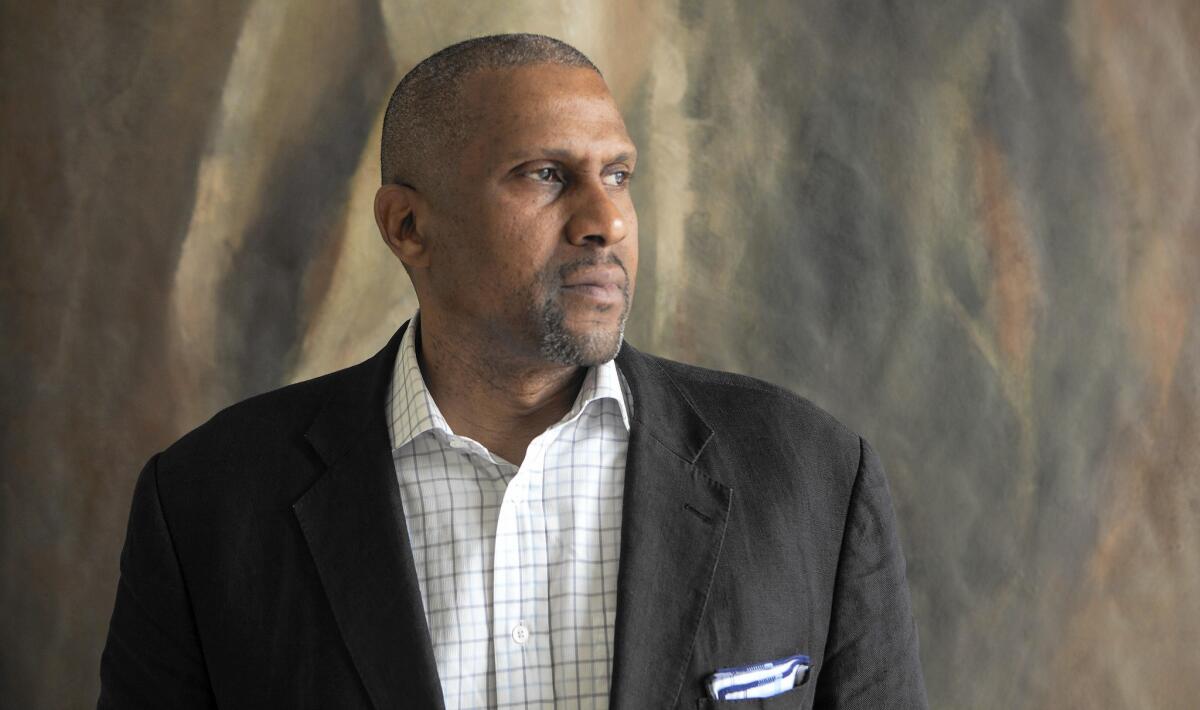Tavis Smiley remembers his friend Maya Angelou

In 1993, Tavis Smiley was an ambitious yet unworldly former aide to Los Angeles Mayor Tom Bradley. Maya Angelou was, among other things, a bestselling author and groundbreaking poet who had recently become the first African American and first woman to read at a presidential inauguration. Traveling to Ghana to give an address, Angelou brought along a small group of friends, plus Smiley, whose mutual friend had lined him up to lend a hand.
“The first time she met me, she said, with that mellifluous voice of hers, ‘And you must be Young Tavis I’ve heard so much about,’” Smiley recalls. Sun pours through a skylight in his Leimert Park office, where he runs his PBS television series, his radio show, his publishing imprint and foundation. Although he was not all that young, he said, “it stuck. Eventually, it became a nickname.”
That trip, and the friendship that grew over the following decades, are commemorated in “My Journey With Maya” (Little, Brown: 224 pp., $27), Smiley’s new book of his recollections and conversations with Angelou, who died at age 86 last May.
FULL COVERAGE: FESTIVAL OF BOOKS
“She’s not just a literary icon, she may very well be the greatest renaissance woman that black America has ever created, and maybe the country,” he says. “Who else has done as many things as she has done, and done them as well? Writing. Directing. Producing. Singing. Dancing. Poetry. Teaching. She’s in a class by herself.”
The moniker Angelou bestowed on him, “Young Tavis,” runs through the book, adding to the sense of its chapters being like Socratic dialogues: Smiley is seeking knowledge and Angelou imparts it. Over the course of two decades, in person and on the phone, they talk about courage and love, Malcolm X and the Rev. Martin Luther King Jr., about art and entertainment and much more.
When people crossed paths with Angelou, she often took on the role of teacher. Actor LeVar Burton says that in the early days of shooting “Roots” (she played his grandmother), Angelou stopped him after he killed a bug on set, scolding, “‘Don’t you ever think that because you are larger than a thing that you have the right to take its life.’ It was a seminal moment,” he recalls. “I will never forget that lesson.”
INTERACTIVE GAME: HOW TO BE A WRITER
Smiley has a similar reverence for Angelou, whose lessons take center stage in his book. “Many of the stories in this book she told her other sons and daughters and friends — she was very consistent in getting her point across,” he says.
That didn’t mean they always saw eye to eye. In one chapter, they debate use of the N-word, arguing even as they finish dinner, moving on to a café to continue the conversation.
“I’ll never accept it,” Angelou says. “I’ll never tolerate it in common usage. It suggests nothing less than the brutal subjugation and degradation of our people. When it is voiced, I can hear our ancestors crying in pain.” Whereas Smiley makes the case that the word is used ironically within the black community, that it has been remade, that context matters, even that it has been used by heroes like King — to no avail. While he doesn’t agree with her, he relents in the text. Point: Angelou.
Smiley, who turned 50 last year, said: “Coming from where she came from, a woman of her generation, her experience — I totally understood her argument. Of all the disagreements that we had, that one was the most uncomfortable for me.
“It’s very important to me that people pay attention to how every disagreement ends in this book, because that’s exactly what happened in real life. It always ends with love. I never walked out of a room with her, never hung up on the phone with her, never dismissed myself from her presence without both of us expressing love to each other, no matter how heated the conversation.”
Angelou died the day before Smiley was scheduled to be the featured speaker at the publishing conference Book Expo last spring. Anjelica Huston led off the event quoting Angelou, and Smiley followed suit by sharing his recollections of her. By the time the day was over, Smiley — whose book “Death of a King: The Real Story of Dr. Martin Luther King Jr.’s Final Year” was not yet out — had plans for this one in the works.
It was a whirlwind schedule. His tour for the King book took him to three dozen cities, he was running his interview show on PBS, rehearsing for and appearing live on “Dancing With the Stars” and working on the Angelou book catch as catch can, “on plane rides and in bathroom stalls,” he says. “It was the most insane thing I’ve ever done.”
Angelou’s personality comes through in the book, which opens up a remarkable connection to a legacy of African American intellectual and creative life that included friendships with James Baldwin, Malcolm X and King. In the early 1960s, she even made the acquaintance of W.E.B. Du Bois in Accra, Ghana; the reason for the trip to Ghana with Smiley three decades later was to give a speech at Du Bois’ home, now a cultural center.
“I won’t talk about this too long because I’ll cry at this point,” Smiley says, his voice cracking without losing his TV host poise. “She was never judgmental. I was never as smart as she was, I was never as learned as she was, I wasn’t as worldly as she was, I wasn’t as wise as she was, I wasn’t as cosmopolitan as she was. And never, ever, ever, from the first time we spent hours talking in Africa, did she ever make me feel those things that I knew I was not.”
Smiley will appear at the Festival of Books Sat. April 18 at 2:30 p.m. on the LA Times Stage.
More to Read
Sign up for our Book Club newsletter
Get the latest news, events and more from the Los Angeles Times Book Club, and help us get L.A. reading and talking.
You may occasionally receive promotional content from the Los Angeles Times.







